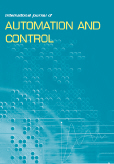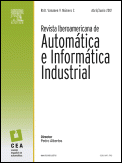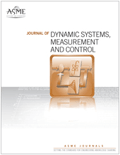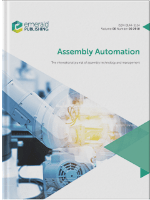
International Journal of Automation and Control
Scope & Guideline
Elevating Standards: Discover the Latest in Automation and Control Technologies.
Introduction
Aims and Scopes
- Automation and Robotics:
Research on the design and control of robotic systems, including autonomous vehicles and surgical robots, emphasizing intelligent control strategies and real-time decision-making. - Control Theory and Applications:
Development and implementation of control strategies such as sliding mode control, PID control, and model predictive control for various engineering applications. - Energy Management Systems:
Innovative approaches to managing energy systems, particularly in renewable energy sources and electric vehicles, focusing on optimization and control techniques. - Intelligent Systems and Machine Learning:
Integration of machine learning algorithms with control systems for fault detection, system identification, and adaptive control, enhancing system performance and reliability. - Simulation and Modeling:
Use of simulation-based methodologies to model complex systems and evaluate control strategies, providing a platform for testing and validation of theoretical approaches.
Trending and Emerging
- Real-Time Control Systems:
There is a marked increase in research focused on real-time control systems for robotics and autonomous vehicles, emphasizing the need for immediate data processing and decision-making capabilities. - Neural Network and AI Integration:
The integration of neural networks and artificial intelligence in control systems is on the rise, with studies exploring how these technologies can enhance adaptive control and system performance. - Sustainable Energy Solutions:
Research on energy management systems, particularly in renewable energy applications, is trending as industries seek sustainable solutions to energy challenges, including smart grid technologies. - Advanced Sliding Mode Control Techniques:
An emerging focus on novel sliding mode control strategies tailored for complex systems indicates a growing interest in robust control methods that can handle uncertainties and disturbances. - Bio-Inspired Control Strategies:
There is an increasing trend towards bio-inspired approaches in control systems, utilizing strategies derived from natural systems for enhanced adaptability and efficiency in robotics and automation.
Declining or Waning
- Traditional Control Techniques:
While control techniques like classical PID controllers remain important, there is a noticeable decline in papers focusing exclusively on these methods, as the field shifts towards more adaptive and intelligent control strategies. - Generic Optimization Algorithms:
Research centered around traditional optimization algorithms, such as basic genetic algorithms or particle swarm optimization without specific enhancements, is becoming less frequent as more sophisticated, problem-specific methods gain traction. - Basic Fault Detection Methods:
The emphasis on conventional fault detection techniques is waning as researchers increasingly adopt advanced machine learning approaches that provide more robust and adaptive solutions.
Similar Journals

Revista Iberoamericana de Automatica e Informatica Industrial
Bridging Theory and Practice in Industrial InformaticsRevista Iberoamericana de Automatica e Informatica Industrial (ISSN: 1697-7912, E-ISSN: 1697-7920) is a distinguished open-access journal published by UNIV POLITECNICA VALENCIA, EDITORIAL UPV, since its inception in 2007. Based in Valencia, Spain, the journal aims to foster the dissemination of high-quality research in the fields of automation and industrial informatics. With a commendable impact reflected in its 2023 Scopus rankings—Q2 in Computer Science (miscellaneous) and Q3 in Control and Systems Engineering—it serves as a pivotal platform for innovative contributions from both established researchers and emerging scholars. The journal is committed to accessibility, ensuring that all articles are freely available to a global audience, promoting collaborative advancement in technology and engineering. Its coverage spans from 2007 to 2024, making it a valuable resource for those engaged in cutting-edge research and applications in the interdisciplinary landscape of computer science and engineering.

Systems Science & Control Engineering
Empowering Innovation through Systems Science.Systems Science & Control Engineering, published by Taylor & Francis Ltd, stands out as a premier open-access journal devoted to the advancement of control systems, optimization methodologies, and artificial intelligence applications within engineering. Since its inception in 2013, the journal has garnered a strong reputation evidenced by its impressive categorization in 2023, ranking Q2 in Artificial Intelligence and achieving Q1 status in both Control and Optimization and Control and Systems Engineering. With a Scopus ranking that places it among the top tier of its fields—being positioned 7th in Control and Optimization—this journal serves as an essential resource for researchers, industry professionals, and students who are seeking to publish high-quality research and stay abreast of innovative developments. The journal emphasizes the integration of theoretical frameworks with practical applications, aiming to foster interdisciplinary collaboration and stimulate future research directions in systems science.

Journal of Control Automation and Electrical Systems
Driving Excellence in Control Automation ResearchThe Journal of Control Automation and Electrical Systems, published by SPRINGER, is a prominent academic journal dedicated to advancing research in the interdisciplinary fields of control systems, automation, and electrical engineering. With an ISSN of 2195-3880 and E-ISSN of 2195-3899, this journal has emerged as a vital platform for disseminating high-quality research, contributing significantly to both theoretical and applied aspects of these interrelated domains. As of 2023, it ranks in the Q2 and Q3 quartiles across multiple categories, including Electrical and Electronic Engineering and Energy Engineering, showcasing its relevance and impact in the field. Although not an open-access journal, it provides rich access options for research works, ensuring that findings reach a wide audience. Researchers, professionals, and students alike can draw valuable insights from its curated articles that explore emerging trends, innovative technologies, and practical applications, thus reinforcing its position as a key contributor to the advancement of control and automation systems.

JOURNAL OF DYNAMIC SYSTEMS MEASUREMENT AND CONTROL-TRANSACTIONS OF THE ASME
Transforming research into practical solutions for dynamic challenges.JOURNAL OF DYNAMIC SYSTEMS MEASUREMENT AND CONTROL - TRANSACTIONS OF THE ASME is a renowned periodical published by the American Society of Mechanical Engineers (ASME), focused on advancing the field of dynamic systems, measurement, and control. With a rich publication history spanning from 1971 to 2025, this journal serves as a pivotal platform for disseminating high-quality research aimed at enhancing understanding and innovation in various sectors, including mechanical engineering, control and systems engineering, and information systems. The journal currently holds a respectable Q2 category ranking in multiple fields, reflecting its commitment to excellence and rigorous peer-review standards. Although it does not offer open access, its extensive reach within the academic community exemplifies its significance, making it an indispensable resource for researchers, professionals, and students eager to engage with cutting-edge advancements. For those seeking to expand their knowledge and contribute to the dialogue surrounding dynamic systems and control mechanisms, JOURNAL OF DYNAMIC SYSTEMS MEASUREMENT AND CONTROL stands out as a critical reference.

AUTOMATION AND REMOTE CONTROL
Exploring the Frontiers of Control TechnologiesAUTOMATION AND REMOTE CONTROL, published by MAIK Nauka/Interperiodica/Springer, is a distinguished international journal renowned for its contribution to the fields of Control and Systems Engineering and Electrical and Electronic Engineering. With an ISSN of 0005-1179 and an E-ISSN of 1608-3032, this journal has been pivotal since its inception in 1973, offering valuable insights and innovative research findings that span the spectrum of automation technologies and control systems. While categorized in the Q3 quartile in both relevant engineering categories as of 2023, it holds a significant position for researchers aiming to disseminate and access quality research in these areas. The journal emphasizes the importance of integrating advanced automation methods and control strategies, fostering the exchange of knowledge among academics, industry professionals, and students alike. Although it does not provide open access options, the compelling research presented within its pages continues to influence the ongoing development of automation systems worldwide.

Journal of Engineering-JOE
Connecting Ideas, Advancing EngineeringThe Journal of Engineering-JOE, published by WILEY, is a leading Open Access journal established in 2013 that caters to the dynamic field of engineering. With a focus on disseminating high-quality research, JOE provides a platform for scholars, professionals, and students to share innovative findings across various engineering disciplines, including but not limited to civil, mechanical, electrical, and environmental engineering. The journal's commitment to accessibility allows for the wide distribution of knowledge, ensuring that groundbreaking research reaches a global audience. With the advantage of Open Access, articles published in JOE are freely available, fostering enhanced collaboration and engagement within the engineering community. The journal plays a crucial role in bridging academic findings with practical applications, making it an essential resource for those seeking to stay at the forefront of engineering advancements.

Transactions of the Canadian Society for Mechanical Engineering
Fostering Innovation and Collaboration in Mechanical EngineeringTransactions of the Canadian Society for Mechanical Engineering, published by Canadian Science Publishing, stands as a pivotal journal within the field of Mechanical Engineering, boasting an ISSN of 0315-8977 and an E-ISSN of 2816-5691. With a history extending back to 1972, this journal serves as a critical platform for disseminating cutting-edge research, reviews, and innovative applications that advance the discipline. Ranked in the Q3 Quartile for Mechanical Engineering and holding a Scopus rank of #372/672, it reflects a robust academic quality that seeks to engage researchers, professionals, and students alike. While currently not offering open access, the journal is committed to enhancing the visibility and exchange of knowledge pertinent to mechanical engineering challenges and breakthroughs occurring both in Canada and globally. Researchers are encouraged to contribute their findings to foster collaboration and development within this vital area of engineering.

International Journal of Fuzzy Systems
Advancing Knowledge in Fuzzy Systems and Artificial IntelligenceThe International Journal of Fuzzy Systems, published by SPRINGER HEIDELBERG, is a premier platform for disseminating cutting-edge research in the fields of Artificial Intelligence, Control and Systems Engineering, Computational Theory and Mathematics, and more. With an impressive impact factor reflected in its Q2 category rankings across various domains, this journal serves as a vital resource for researchers, professionals, and students eager to explore the applications of fuzzy logic in solving complex real-world problems. Established in 2004, the journal continues to contribute significantly to theoretical advancements and practical implementations in areas such as information systems and software engineering. The journal does not offer Open Access, ensuring a curated audience of engaged readers and contributors. Its rigorous peer-review process guarantees high-quality publications that resonate within the scientific community. For those interested in the intersection of theoretical insights and practical applications, the International Journal of Fuzzy Systems stands out as an essential venue for knowledge exchange and innovation.

ASSEMBLY AUTOMATION
Shaping Tomorrow's Automation Landscape TodayASSEMBLY AUTOMATION, published by EMERALD GROUP PUBLISHING LTD, is a pivotal journal that has been addressing the field of industrial and manufacturing engineering since its inception in 1980. With an ISSN of 0144-5154 and an E-ISSN of 1758-4078, this journal is dedicated to advancing the knowledge and practices in assembly and automation technologies, essential for today’s competitive industrial landscape. Though its coverage in Scopus has been discontinued, it maintains a respectable ranking of #116/355 in Industrial and Manufacturing Engineering and #105/286 in Control and Systems Engineering, placing it in the 67th and 63rd percentiles, respectively. The journal serves as a valuable resource for researchers, professionals, and students seeking insights into the latest developments and trends in the automation sector. While Open Access options are available, readers can immerse themselves in a vast array of impactful studies that delve into operational efficiency, innovative manufacturing solutions, and the future of automation technologies.

IEEE Canadian Journal of Electrical and Computer Engineering
Fostering Global Collaboration in Engineering ExcellenceWelcome to the IEEE Canadian Journal of Electrical and Computer Engineering, an esteemed publication by IEEE CANADA, dedicated to advancing the field of electrical and computer engineering. Since its inception in 2021, this journal has served as a vital platform for scholarly communication, encouraging the dissemination of innovative research and practical applications within the realms of electrical and electronic engineering, as well as hardware and architecture. With an impressive Q3 ranking in both categories for 2023, the journal is gaining recognition among academics and professionals alike, asserting a solid position within the competitive landscape of engineering publications. The journal is accessible as an open access resource, ensuring that groundbreaking studies are made available to a global audience, fostering collaboration and knowledge transfer. Published in Canada, the journal aims to highlight research from this vibrant region while also welcoming contributions from international experts, ultimately propelling scholarly discourse in electrical and computer engineering forward.